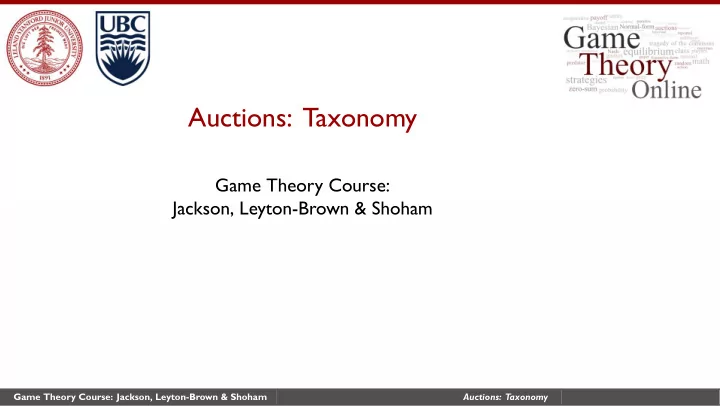

Auctions: Taxonomy Game Theory Course: Jackson, Leyton-Brown & Shoham Game Theory Course: Jackson, Leyton-Brown & Shoham Auctions: Taxonomy .
. Motivation • Auctions are any mechanisms for allocating resources among self-interested agents • Very widely used • government sale of resources • privatization • stock market • request for quote • FCC spectrum • real estate sales • eBay Game Theory Course: Jackson, Leyton-Brown & Shoham Auctions: Taxonomy .
. CS Motivation • resource allocation is a fundamental problem in CS • increasing importance of studying distributed systems with heterogeneous agents • markets for: • computational resources • P2P systems • network bandwidth • currency needn’t be real money, just something scarce • that said, real money trading agents are also an important motivation Game Theory Course: Jackson, Leyton-Brown & Shoham Auctions: Taxonomy .
. Some Canonical Auctions • English • Japanese • Dutch • First-Price • Second-Price • All-Pay Game Theory Course: Jackson, Leyton-Brown & Shoham Auctions: Taxonomy .
. English Auction . English Auction . • auctioneer starts the bidding at some “reservation price” • bidders then shout out ascending prices • once bidders stop shouting, the high bidder gets the good at that price . Game Theory Course: Jackson, Leyton-Brown & Shoham Auctions: Taxonomy .
. Japanese Auction . Japanese Auction . • Same as an English auction except that the auctioneer calls out the prices • all bidders start out standing • when the price reaches a level that a bidder is not willing to pay, that bidder sits down • once a bidder sits down, they can’t get back up • the last person standing gets the good . • analytically more tractable than English because jump bidding can’t occur • consider the branching factor of the extensive form game... Game Theory Course: Jackson, Leyton-Brown & Shoham Auctions: Taxonomy .
. Dutch Auction . Dutch Auction . • the auctioneer starts a clock at some high value; it descends • at some point, a bidder shouts “mine!” and gets the good at the price shown on the clock . Game Theory Course: Jackson, Leyton-Brown & Shoham Auctions: Taxonomy .
. First-, Second-Price Auctions . First-Price Auction . • bidders write down bids on pieces of paper • auctioneer awards the good to the bidder with the highest bid • that bidder pays the amount of his bid . . Second-Price Auction . • bidders write down bids on pieces of paper • auctioneer awards the good to the bidder with the highest bid • that bidder pays the amount bid by the second-highest bidder . Game Theory Course: Jackson, Leyton-Brown & Shoham Auctions: Taxonomy .
. All-Pay auction . All-Pay Auction . • bidders write down bids on pieces of paper • auctioneer awards the good to the bidder with the highest bid • everyone pays the amount of their bid regardless of whether or not they win . Game Theory Course: Jackson, Leyton-Brown & Shoham Auctions: Taxonomy .
. Auctions as Structured Negotiations Any negotiation mechanism that is: • market-based (determines an exchange in terms of currency) • mediated (auctioneer) • well-specified (follows rules) Defined by three kinds of rules: • rules for bidding • rules for what information is revealed • rules for clearing Game Theory Course: Jackson, Leyton-Brown & Shoham Auctions: Taxonomy .
. Auctions as Structured Negotiations Defined by three kinds of rules: • rules for bidding • who can bid, when • what is the form of a bid • restrictions on offers, as a function of: • bidder’s own previous bid • auction state (others’ bids) • eligibility (e.g., budget constraints) • expiration, withdrawal, replacement • rules for what information is revealed • rules for clearing Game Theory Course: Jackson, Leyton-Brown & Shoham Auctions: Taxonomy .
. Auctions as Structured Negotiations Defined by three kinds of rules: • rules for bidding • rules for what information is revealed • when to reveal what information to whom • rules for clearing Game Theory Course: Jackson, Leyton-Brown & Shoham Auctions: Taxonomy .
. Auctions as Structured Negotiations Defined by three kinds of rules: • rules for bidding • rules for what information is revealed • rules for clearing • when to clear • at intervals • on each bid • after a period of inactivity • allocation (who gets what) • payment (who pays what) Game Theory Course: Jackson, Leyton-Brown & Shoham Auctions: Taxonomy .
Recommend
More recommend